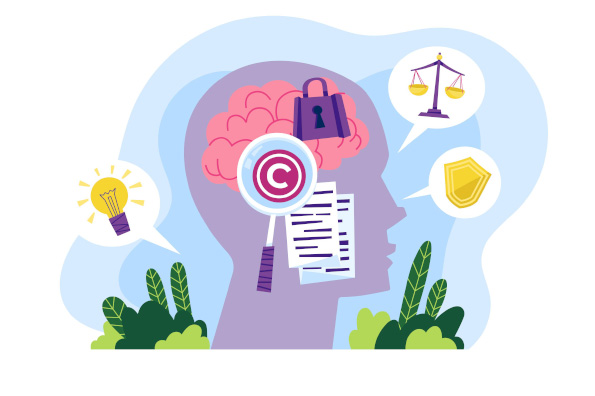Can You License Your IP Without a Lawyer?
In today's knowledge economy, intellectual property (IP) has become one of the most valuable assets for businesses and creators of all sizes. From...
8 min read
LegalGPS : Jun. 5, 2025
The moment you create original content—whether it's a blog post, photograph, song, or software code—it's automatically protected by copyright law. But simply having that protection and being able to effectively enforce your rights are two different matters. This brings us to an important question for content creators: Do you actually need to hire a lawyer to copyright your work?


Legal GPS Pro
Protect your business with our complete legal subscription service, designed by top startup attorneys.
The short answer is no, you don't legally require an attorney to secure copyright protection. However, there are certain situations where professional legal guidance can be valuable. This article will help you understand when you can handle copyright matters yourself and when it might be worth investing in legal assistance.
Before diving into whether you need legal assistance, it's important to understand some copyright basics.
Copyright protection is automatic. As the U.S. Copyright Office clearly states, "Your work is under copyright protection the moment it is created and fixed in a tangible form that it is perceptible either directly or with the aid of a machine or device". This means you don't need to register your work or even publish it to have copyright protection.
What copyright protects are original works of authorship fixed in a tangible medium, including:
However, copyright does not protect facts, ideas, systems, or methods of operation—although it may protect the specific way these things are expressed.
While copyright protection is automatic, copyright registration is a formal process that provides additional legal benefits. Registration involves filing an application with the U.S. Copyright Office, paying a fee, and submitting copies of your work.
Registration is not mandatory, but it offers several important advantages, including:
As the Copyright Alliance explains, "Since copyright protection is automatic from the moment a work is created, registration is not required in order to protect your work. However, there are numerous benefits to registration and therefore it is highly recommended, if feasible" .
Many creators successfully register their copyrights without legal assistance. The U.S. Copyright Office has made significant improvements to streamline the process, particularly with their electronic Copyright Office (eCO) system.
The basic steps for DIY copyright registration include:
The current standard registration fee is $55, though this can be reduced to $35 if your work meets certain criteria: it has a single author who is also the owner, it's a single work (not a collection), and it wasn't created as a work for hire.
For many straightforward copyright registrations, this DIY approach works perfectly well. As intellectual property lawyer Nicholas Wells notes, the process "is not difficult" though "there are questions on the application form that will require some research".
If you're handling registration yourself, consider these best practices:
While many copyright registrations are straightforward enough to handle yourself, certain situations make professional legal assistance particularly valuable.
If your work involves multiple contributors, was created as a work-for-hire, or has a complicated ownership structure, the registration process becomes more complex. As LegalZoom points out, "If you are one of multiple authors of a work, the registration process can be trickier to navigate".
For instance, determining who actually owns the copyright when multiple parties contribute to a work can be legally complicated. An attorney can help clarify these issues before they become problems.
If your work has substantial commercial potential or represents a major investment, the relatively small cost of legal assistance provides important insurance. For creative works that form the core of your business or career, the additional protection of attorney-guided registration can be well worth the investment.
While U.S. copyright law automatically protects your work in many countries through international treaties, the specifics can vary significantly. If you plan to market or distribute your work internationally, an attorney can help you understand which protections apply in which countries and whether additional registrations are necessary.
Certain specialized copyright registrations have unique requirements that can be challenging to navigate without expertise. These include:
If you anticipate needing to enforce your copyrights against potential infringers, having an attorney involved from the registration stage can strengthen your position. They can help ensure your registration properly covers all protectable elements of your work and advise on enforcement strategies.
Michael, a professional photographer, had accumulated thousands of images over his career. After discovering some of his work being used without permission by a major company, he realized he needed to register his copyrights to take legal action.
Initially, Michael attempted to register his photographs himself, planning to submit them as a collection. However, he was confused by the Copyright Office's requirements for group registration of photographs, which had recently changed. After spending days trying to understand the rules, he hired an intellectual property attorney.
The attorney identified several critical issues with Michael's planned submission:
With the attorney's guidance, Michael properly organized his registrations, provided accurate publication information, and successfully registered over 3,000 images. When he later discovered more unauthorized uses, he was able to pursue infringement claims with proper registrations in place, ultimately recovering substantial damages.
When deciding whether to hire a lawyer for copyright registration, consider both the costs and potential benefits.


Legal GPS Pro
Protect your business with our complete legal subscription service, designed by top startup attorneys.
For many creators, the key consideration is whether the added cost of legal assistance provides sufficient value. An intellectual property attorney typically charges $250 to $500 to prepare and file a standard copyright application . While this is significantly more than the DIY approach, it's relatively affordable compared to many other legal services.
The value calculation should consider:
If you want legal assistance but are concerned about costs, consider these options:
While registration is important, there are other copyright-related situations where legal assistance becomes even more valuable:
If you discover someone using your work without permission, an attorney can help you assess the strength of your case, determine if fair use or other exceptions might apply, and guide you through enforcement options. As LegalMatch notes, "Defending your copyright can be difficult, whether it is registered or not".
When entering into agreements to let others use your copyrighted material, professional legal advice helps ensure you're not giving away more rights than intended. A copyright lawyer can draft or review licensing agreements to protect your interests.
Certain creative works present unique copyright challenges that benefit from specialized legal knowledge:
Sarah, an author, self-published her first novel and registered the copyright herself to save money. Two years later, when preparing to file an infringement lawsuit against a website that had posted her entire book without permission, her attorney discovered a problem: Sarah had incorrectly categorized her work during registration.
Though this might seem like a minor error, it created a significant legal hurdle. Before proceeding with the infringement case, Sarah had to file a supplementary registration to correct the error, delaying her lawsuit by several months and incurring additional legal costs. Had she consulted an attorney for the initial registration, this problem could have been avoided.
The decision to hire a lawyer for copyright matters should be based on your specific circumstances:
DIY copyright registration may be sufficient when:
Legal assistance becomes more valuable when:
Remember that while copyright protection is automatic, registration provides crucial benefits if you ever need to enforce your rights. The U.S. Copyright Office emphasizes that "Registration is recommended for a number of reasons. Many choose to register their works because they wish to have the facts of their copyright on the public record and have a certificate of registration. Registered works may be eligible for statutory damages and attorney's fees in successful litigation" .
For many creators, a hybrid approach makes sense: handle simple, routine registrations yourself, but seek legal guidance for more complex work or situations where enforcement is likely to be necessary. This balanced strategy provides protection while managing legal costs appropriately.
Whatever approach you choose, remember that proper copyright registration is an investment in protecting your creative work and preserving your ability to control and benefit from it.
Do I need to register my copyright to be protected?
No. Copyright protection is automatic from the moment you create your work in a fixed, tangible form. However, registration provides important additional benefits, particularly if you need to enforce your rights.
What does copyright registration cost?
The standard electronic filing fee is $55, though this can be reduced to $35 for single works by a single author who is also the owner. If you hire an attorney, expect to pay an additional $250-$500 for a straightforward registration.
Is the 'poor man's copyright' (mailing yourself a copy of your work) legally valid?
No. The U.S. Copyright Office explicitly states, "The practice of sending a copy of your own work to yourself is sometimes called a 'poor man's copyright.' There is no provision in the copyright law regarding any such type of protection, and it is not a substitute for registration" .
How long does copyright registration take?
Processing times vary based on the Copyright Office's workload and the type of application. Electronic applications typically take 3-6 months, though this can vary significantly. Expedited processing is available for an additional fee ($800) in special circumstances.
Can I register multiple works with one application?
In certain cases, yes. The Copyright Office offers group registration options for specific types of works, including collections of unpublished works, published photographs, contributions to periodicals, and short online literary works. Each type has specific requirements.
If I discover infringement before registering my copyright, can I still sue?
You can register your copyright after discovering infringement and then file a lawsuit. However, if the infringement began before registration, you generally won't be eligible for statutory damages or attorney's fees, making the case potentially less viable financially.

Legal GPS Pro
Protect your business with our complete legal subscription service, designed by top startup attorneys.
|
Premium Template
Single-use Template |
Legal GPS Pro
Unlimited Access, Best Value |
|
|
| Choose Template | Learn More |
| Trusted by 1000+ businesses | |

In today's knowledge economy, intellectual property (IP) has become one of the most valuable assets for businesses and creators of all sizes. From...

Whether you're lending money to a family member, a friend, or a business associate, having a proper loan agreement in place is crucial for protecting...

Terminating an employee is rarely a pleasant experience. Beyond the emotional and practical challenges, employers often wonder about the legal risks...